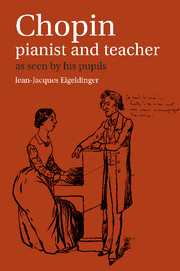Book contents
- Frontmatter
- Contents
- List of illustrations
- Acknowledgements
- Explanation of references
- Editor's note
- Abbreviations
- Introduction
- Part I Technique and style
- Part 2 Interpretation of Chopin's works
- Notes
- List of Chopin's pupils whose recollections are quoted in this book
- Appendix I Translated transcript of Chopin's ‘Sketch for a method’ (Projet de méthode)
- Appendix II Annotated scores belonging to pupils and associates of Chopin
- Appendix III Fingerings and annotations in the scores of pupils and associates
- Appendix IV Chopin's playing described by his contemporaries
- Bibliography
- Index of persons
- Index of musical works
Introduction
Published online by Cambridge University Press: 05 June 2014
- Frontmatter
- Contents
- List of illustrations
- Acknowledgements
- Explanation of references
- Editor's note
- Abbreviations
- Introduction
- Part I Technique and style
- Part 2 Interpretation of Chopin's works
- Notes
- List of Chopin's pupils whose recollections are quoted in this book
- Appendix I Translated transcript of Chopin's ‘Sketch for a method’ (Projet de méthode)
- Appendix II Annotated scores belonging to pupils and associates of Chopin
- Appendix III Fingerings and annotations in the scores of pupils and associates
- Appendix IV Chopin's playing described by his contemporaries
- Bibliography
- Index of persons
- Index of musical works
Summary
True science does not constitute a separate branch of knowledge from art. On the contrary, science, when envisaged like this and demonstrated by a man like Chopin, is art itself.
DelacroixThe authentically minded interpreter who wishes to do justice to masterpieces of the past faces a multitude of complex problems. Musicology, established now for a century as a positive science, has seen its objectives broaden and diversify. Performance practice, without being altogether a new sphere, is now a field in which musicology is proving itself to the greatest effect. In recent times musicological studies have contributed towards revitalizing or reconsidering the interpretation of gregorian chant, Renaissance polyphony and concertante style, also shedding a clearer light on the realization of continuo, ornamentation and improvisatory elements of Baroque music. The combined efforts of organologists, instrument makers and performers enable us to-day to enjoy all the sumptuousness of Monteverdi's instrumental colouring; in Mozart the woodwind take on a new savour, emerging with unaccustomed clarity.
But with the music of the last century, and with Romantic piano music in particular, only recently have we begun to realise that they too present the performer with problems analogous to those encountered in the music of more remote periods. This new preoccupation arises from an awareness that our epoch, no longer comfortably attached to the end of the preceding century, has broken away from it altogether.
- Type
- Chapter
- Information
- Chopin: Pianist and TeacherAs Seen by his Pupils, pp. 1 - 22Publisher: Cambridge University PressPrint publication year: 1987
- 1
- Cited by



